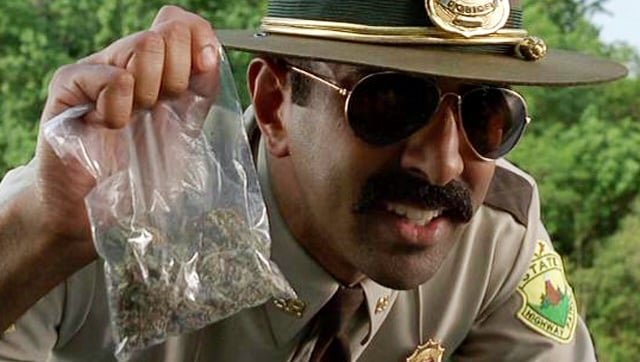Two West Coast police teams have modified their positions and now improve federal hashish legalization efforts, marking the primary time {that a} statewide law enforcement officials group has referred to as for an finish to the country’s prohibition of marijuana. In a up to date announcement characterised as a “historical shift,” the Peace Officials Analysis Affiliation of California (PORAC) and the Oregon Coalition of Police and Sheriffs (ORCOPs) expressed improve for federal law making a felony pathway for marijuana to be legalized from coast to coast.
“The send has sailed,” PORAC wrote in a coverage place paper cited through SFGATE pronouncing the gang’s name for legalizing weed on the federal stage, “and for the majority of American citizens, hashish is felony and available.”
The 2 teams constitute hundreds of legislation enforcement officials operating for police and sheriff’s departments throughout California and Oregon. In a statement from the Coalition for Hashish Coverage, Schooling, and Law (CPEAR), a hashish coverage staff funded partially through pursuits within the alcohol and tobacco industries, the 2 police teams expressed their improve for the Strengthening the 10th Modification Via Entrusting States (STATES) Act. If handed, the law would amend the federal Managed Ingredients Act to exclude hashish actions undertaken in compliance with state or tribal laws.
“The STATES Act does what each and every federal invoice must do –assist all 50 states be successful within the insurance policies they select,” CPEAR government director Andrew Freedman mentioned overdue closing 12 months when the gang recommended the STATES Act. “Whether or not you might be pro-legalization or anti-legalization, we will all recognize the present federal posture of getting its head within the sand isn’t operating.”
“This invoice will create the common sense guardrails that can give protection to our formative years, give protection to our roads, fight towards dependancy and psychosis, and stay hashish out of communities that don’t need it,” he added. “This law does now not intention to open new hashish markets. As an alternative, it merely aligns federal coverage with state coverage in order that current hashish markets are more secure, and federal efforts may also be eager about holding hashish out of states the place it stays unlawful.”
California Cop Staff Antagonistic Prop 64
PORAC, the most important law enforcement officials skilled group in California and the most important statewide staff within the country, adversarial Proposition 64, the 2016 poll measure that legalized leisure marijuana in California after receiving greater than 57% of the vote that 12 months. However as hashish was normalized within the state following legalization, the belief of many participants has modified, main the pro group to modify its stance on felony weed.
“An excellent quantity of officials patrolling the streets this present day know not anything rather than legalized marijuana within the state of California,” PORAC president Brian Wonder advised San Francisco Bay Space on-line information supply SFGATE. “They’re a lot more receptive to conversations on marijuana.”
Wonder mentioned that the STATES Act would permit federal businesses to coordinate their operations without delay with native legislation enforcement to improve felony hashish farms whilst operating to cut back unlicensed cultivation.
“We’re now not making an ethical judgment as as to if you must smoke it or don’t smoke it, however we need to be sure that [legal cannabis companies] aren’t being drowned out through the unlawful marketplace,” mentioned Wonder.
“We actually want to do the whole thing in our energy to remove the unlawful grows in California,” he added.
Wonder mentioned that the coverage shift made through the 2 law enforcement officials teams may be related to the continuing dialog referring to psychedelics coverage reform. He famous that most of the staff’s participants are extra focused on how the medication can be utilized safely slightly than specializing in the continuing prohibition of psychedelics.
“Let’s now not … bury our heads within the sand and simply say ‘No no no, we’re going to be doing natural enforcement,’ when the truth is we must be specializing in violent crimes and making our communities more secure,” Wonder mentioned.
The coverage trade through PORAC and ORCOPs was once praised through leaders who’re operating to reform the country’s hashish coverage. Republican U.S. Consultant Dave Joyce of Ohio, a supporter of an up to date model of the federal invoice referred to as STATES 2.0, thanked the 2 police teams for supporting the law.
“As a former prosecutor, I do know firsthand that our legislation enforcement officials are already stretched skinny – forcing those public servants to stroll a discrepant line between state and federal coverage now not best defies state’s rights however is an inefficient use of treasured legislation enforcement assets,” Joyce mentioned in a statement from CPEAR in regards to the police teams’ endorsement of the law. “Most significantly, it does not anything to support public protection and, in lots of circumstances, works towards it. The STATES 2.0 Act would deal with this complicated discrepancy and empower legislation enforcement of their efforts to put into effect hashish legislation and deal with the original wishes of the communities they constitute.”
The transfer through the 2 police teams to again federal hashish coverage reform was once additionally welcomed through representatives of the regulated pot business. Lex Corwin, the founding father of California-based hashish logo Stone Street Farms, mentioned the “building is indicative of the converting ideological panorama surrounding hashish.”
“The California police staff is correct– the send has sailed. Extra American citizens are in prefer of legalization than ever sooner than and a majority of American citizens are living in a state with leisure or scientific get right of entry to,” Corwin wrote in an e-mail to Prime Occasions. “It’s time for The united states’s legislation enforcement to concentrate on the real crimes plaguing society. Violent crime is up around the country and the earlier we shift our legislation enforcement assets from removing a risk free plant to fixing actual crime the easier.”














